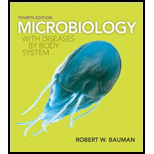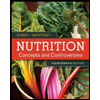
Microbiology with Diseases by Body System (4th Edition)
4th Edition
ISBN: 9780321918550
Author: Robert W. Bauman Ph.D.
Publisher: PEARSON
expand_more
expand_more
format_list_bulleted
Concept explainers
Question
Chapter 15, Problem 11MTF
Summary Introduction
Introduction:
The nonspecific, complex biological response of the body tissues is called inflammation. The tissue damage occurs due to the various causes including, pathogens, chemicals, heat, ultraviolet light, cuts, and abrasions. Inflammation is categorized into two types, namely acute and chronic inflammation.
Expert Solution & Answer
Want to see the full answer?
Check out a sample textbook solution
Students have asked these similar questions
Ch.23
How is Salmonella able to cross from the intestines into the blood?
A. it is so small that it can squeeze between intestinal cells
B. it secretes a toxin that induces its uptake into intestinal epithelial cells
C. it secretes enzymes that create perforations in the intestine
D. it can get into the blood only if the bacteria are deposited directly there, that is, through a puncture
—
Which virus is associated with liver cancer?
A. hepatitis A
B. hepatitis B
C. hepatitis C
D. both hepatitis B and C
—
explain your answer thoroughly
Ch.21
What causes patients infected with the yellow fever virus to turn yellow (jaundice)?
A. low blood pressure and anemia
B. excess leukocytes
C. alteration of skin pigments
D. liver damage in final stage of disease
—
What is the advantage for malarial parasites to grow and replicate in red blood cells?
A. able to spread quickly
B. able to avoid immune detection
C. low oxygen environment for growth
D. cooler area of the body for growth
—
Which microbe does not live part of its lifecycle outside humans?
A. Toxoplasma gondii
B. Cytomegalovirus
C. Francisella tularensis
D. Plasmodium falciparum
—
explain your answer thoroughly
Ch.22
Streptococcus pneumoniae has a capsule to protect it from killing by alveolar macrophages, which kill bacteria by…
A. cytokines
B. antibodies
C. complement
D. phagocytosis
—
What fact about the influenza virus allows the dramatic antigenic shift that generates novel strains?
A. very large size
B. enveloped
C. segmented genome
D. over 100 genes
—
explain your answer thoroughly
Chapter 15 Solutions
Microbiology with Diseases by Body System (4th Edition)
Ch. 15 - Prob. 1TMWCh. 15 - Some strains of Staphylococcus aureus produce...Ch. 15 - Evaluating an Abnormal CBC Roger Brown, an African...Ch. 15 - Prob. 3TMWCh. 15 - Phagocytes of the epidermis are called _________....Ch. 15 - Mucus-secreting membranes are found in ________....Ch. 15 - The complement system involves _________. a. the...Ch. 15 - The alternative complement activation pathway...Ch. 15 - Prob. 5MCCh. 15 - The type of interferon present late in an...
Ch. 15 - Interferons ________. a. do not protect the cell...Ch. 15 - Prob. 8MCCh. 15 - Toll-like receptors (TLRs) act to ________. a....Ch. 15 - Prob. 10MCCh. 15 - Modified True/False 1. _______ The surface cells...Ch. 15 - Modified True/False 2. _______ The surface cells...Ch. 15 - Prob. 3MTFCh. 15 - Prob. 4MTFCh. 15 - Prob. 5MTFCh. 15 - Prob. 6MTFCh. 15 - Prob. 7MTFCh. 15 - Prob. 8MTFCh. 15 - Prob. 9MTFCh. 15 - Prob. 10MTFCh. 15 - Prob. 11MTFCh. 15 - Prob. 12MTFCh. 15 - Prob. 13MTFCh. 15 - Modified True/False 14. ___________________...Ch. 15 - Modified True/False 15. __________________ NETs...Ch. 15 - Prob. 1MCh. 15 - Write the letter of the description that applies...Ch. 15 - Label the steps of phagocytosis.Ch. 15 - Prob. 2VICh. 15 - In order for a pathogen to cause disease, what...Ch. 15 - How does a phagocyte know it is in contact with a...Ch. 15 - Give three characteristics of the epidermis that...Ch. 15 - What is the role of Toll-like receptors in innate...Ch. 15 - Describe the classical complement cascade pathway...Ch. 15 - Prob. 6SACh. 15 - John received a chemical burn on his arm and was...Ch. 15 - What might happen to someone whose body did not...Ch. 15 - Prob. 3CTCh. 15 - Prob. 4CTCh. 15 - There are two kinds of agranulocytes in the...Ch. 15 - A patient has a genetic disorder that prevents him...Ch. 15 - Prob. 7CTCh. 15 - Scientists can raise germ-free animals in axenic...Ch. 15 - Prob. 9CTCh. 15 - Scientists are interested in developing...Ch. 15 - A medical laboratory scientist argues that...Ch. 15 - A patient has a genetic disorder that makes it...Ch. 15 - Prob. 13CTCh. 15 - Prob. 14CTCh. 15 - Using the following terms, fill in the following...
Knowledge Booster
Learn more about
Need a deep-dive on the concept behind this application? Look no further. Learn more about this topic, biology and related others by exploring similar questions and additional content below.Similar questions
- What is this?arrow_forwardMolecular Biology A-C components of the question are corresponding to attached image labeled 1. D component of the question is corresponding to attached image labeled 2. For a eukaryotic mRNA, the sequences is as follows where AUGrepresents the start codon, the yellow is the Kozak sequence and (XXX) just represents any codonfor an amino acid (no stop codons here). G-cap and polyA tail are not shown A. How long is the peptide produced?B. What is the function (a sentence) of the UAA highlighted in blue?C. If the sequence highlighted in blue were changed from UAA to UAG, how would that affecttranslation? D. (1) The sequence highlighted in yellow above is moved to a new position indicated below. Howwould that affect translation? (2) How long would be the protein produced from this new mRNA? Thank youarrow_forwardMolecular Biology Question Explain why the cell doesn’t need 61 tRNAs (one for each codon). Please help. Thank youarrow_forward
- Molecular Biology You discover a disease causing mutation (indicated by the arrow) that alters splicing of its mRNA. This mutation (a base substitution in the splicing sequence) eliminates a 3’ splice site resulting in the inclusion of the second intron (I2) in the final mRNA. We are going to pretend that this intron is short having only 15 nucleotides (most introns are much longer so this is just to make things simple) with the following sequence shown below in bold. The ( ) indicate the reading frames in the exons; the included intron 2 sequences are in bold. A. Would you expected this change to be harmful? ExplainB. If you were to do gene therapy to fix this problem, briefly explain what type of gene therapy youwould use to correct this. Please help. Thank youarrow_forwardMolecular Biology Question Please help. Thank you Explain what is meant by the term “defective virus.” Explain how a defective virus is able to replicate.arrow_forwardMolecular Biology Explain why changing the codon GGG to GGA should not be harmful. Please help . Thank youarrow_forward
- Stage Percent Time in Hours Interphase .60 14.4 Prophase .20 4.8 Metaphase .10 2.4 Anaphase .06 1.44 Telophase .03 .72 Cytukinesis .01 .24 Can you summarize the results in the chart and explain which phases are faster and why the slower ones are slow?arrow_forwardCan you circle a cell in the different stages of mitosis? 1.prophase 2.metaphase 3.anaphase 4.telophase 5.cytokinesisarrow_forwardWhich microbe does not live part of its lifecycle outside humans? A. Toxoplasma gondii B. Cytomegalovirus C. Francisella tularensis D. Plasmodium falciparum explain your answer thoroughly.arrow_forward
- Select all of the following that the ablation (knockout) or ectopoic expression (gain of function) of Hox can contribute to. Another set of wings in the fruit fly, duplication of fingernails, ectopic ears in mice, excess feathers in duck/quail chimeras, and homeosis of segment 2 to jaw in Hox2a mutantsarrow_forwardSelect all of the following that changes in the MC1R gene can lead to: Changes in spots/stripes in lizards, changes in coat coloration in mice, ectopic ear formation in Siberian hamsters, and red hair in humansarrow_forwardPleiotropic genes are genes that (blank) Cause a swapping of organs/structures, are the result of duplicated sets of chromosomes, never produce protein products, and have more than one purpose/functionarrow_forward
arrow_back_ios
SEE MORE QUESTIONS
arrow_forward_ios
Recommended textbooks for you
 Nutrition: Concepts and Controversies - Standalo...Health & NutritionISBN:9781305627994Author:Frances Sizer, Ellie WhitneyPublisher:Brooks Cole
Nutrition: Concepts and Controversies - Standalo...Health & NutritionISBN:9781305627994Author:Frances Sizer, Ellie WhitneyPublisher:Brooks Cole- Essentials of Pharmacology for Health ProfessionsNursingISBN:9781305441620Author:WOODROWPublisher:Cengage
 Anatomy & PhysiologyBiologyISBN:9781938168130Author:Kelly A. Young, James A. Wise, Peter DeSaix, Dean H. Kruse, Brandon Poe, Eddie Johnson, Jody E. Johnson, Oksana Korol, J. Gordon Betts, Mark WomblePublisher:OpenStax College
Anatomy & PhysiologyBiologyISBN:9781938168130Author:Kelly A. Young, James A. Wise, Peter DeSaix, Dean H. Kruse, Brandon Poe, Eddie Johnson, Jody E. Johnson, Oksana Korol, J. Gordon Betts, Mark WomblePublisher:OpenStax College



Nutrition: Concepts and Controversies - Standalo...
Health & Nutrition
ISBN:9781305627994
Author:Frances Sizer, Ellie Whitney
Publisher:Brooks Cole

Essentials of Pharmacology for Health Professions
Nursing
ISBN:9781305441620
Author:WOODROW
Publisher:Cengage


Anatomy & Physiology
Biology
ISBN:9781938168130
Author:Kelly A. Young, James A. Wise, Peter DeSaix, Dean H. Kruse, Brandon Poe, Eddie Johnson, Jody E. Johnson, Oksana Korol, J. Gordon Betts, Mark Womble
Publisher:OpenStax College